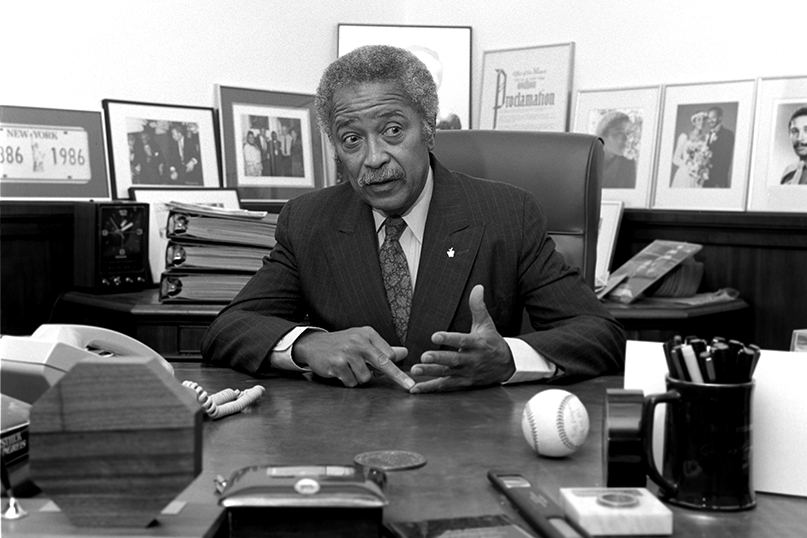
By Ben Sales
(JTA) – David Dinkins, the first Black mayor of New York City, died at age 93 on Monday, Nov. 23, nearly three decades after losing a reelection bid in part over his response to riots in a Black and Hasidic Orthodox neighborhood of Brooklyn.
Dinkins was born in Trenton, New Jersey and entered New York City politics after graduating law school. Elected in 1989 as New York City was enduring high levels of crime and interracial strife, Dinkins promised to bring healing and reconciliation to the city. But a series of violent acts raised pressure on him, which came to a head in 1991 in Crown Heights, Brooklyn.
That August, a car in the motorcade of Chabad Lubavitch Rabbi Menachem Mendel Schneerson, known as the Rebbe, accidentally struck and killed a Black seven-year-old named Gavin Cato. Hours later, amid outrage over Cato’s death, a group of Black men in the neighborhood murdered Yankel Rosenbaum, a Lubavitch rabbinical student. The deaths touched off days of rioting in the neighborhood in which more than 200 people were injured and more than 150 arrested.
Critics charged that Dinkins restrained the police, allowing rioters to harm Crown Heights’ Jews. The criticism followed Dinkins for years after the riots and was the subject of an investigation by New York state as well as a federal class action suit filed by members of the Crown Heights Jewish community.
The suit alleged that Dinkins allowed rioters to “vent their rage over [Cato’s death] at the expense of the lives and property of Jews and other non-blacks present in the Crown Heights community.” It also alleged that city officials gave tacit approval to the “murderous, antisemitic rampage which engulfed the Brooklyn community of Crown Heights for four days.”
On a 1993 visit to Israel, Dinkins met protests, and Avi Weiss, the outspoken New York City Orthodox rabbi and activist, charged him with allowing a “pogrom.”
The criticism did not subside even as Dinkins defended his actions and continued to engage with the Jewish community. He had visited Rosenbaum on his deathbed and had urged calm, and denied that he had restrained police. He attributed the criticism to his race.
“There is not a single shred of evidence that I held the [New York Police Department] back – and there never will be,” Dinkins said in a speech at the Jewish Theological Seminary more than a year after the riots. He said some of his critics “see everything through an ethnic prism.”
But the response to the riots contributed to Dinkins’ election loss to Rudy Giuliani in 1993. In three Brooklyn Hasidic neighborhoods – Crown Heights, Williamsburg and Borough Park – approximately 97% of voters backed Giuliani.
The controversy over Dinkins’ response to the riots overshadowed an earlier incident when he was threatened for standing up against antisemitism. In 1985, ahead of a visit to New York City by the antisemitic Nation of Islam leader Louis Farrakhan, Dinkins organized a press conference denouncing Farrakhan’s ‘blatantly antisemitic” remarks.
Farrakhan then threatened Dinkins, then the city clerk, during his speech.
“What I’m suggesting to black people is that leaders have to begin to fear the people that they say they represent,” Farrakhan said after calling Dinkins out personally. “When the leader sells out to people, he should pay a price for that. Don’t you think so? Do you think the leader should sell out and then live?”
Dinkins received a police guard following the speech.
“For his courage and moral clarity, Dinkins was threatened directly by Farrakhan,” tweeted Jeremy Burton, who served as Dinkins’ deputy director of Jewish community affairs while he was mayor. “He also earned my admiration and that of many members of our community. To this day I wish that more people had Mayor Dinkins’ clarity in that moment.”
Dinkins died in his home on the Upper East Side of Manhattan. His wife of 67 years died in October; they are survived by two children.
Main Photo: David Dinkins, pictured here in 1986, was elected New York City’s first black mayor in 1989. (Credit: Karjean Levine/Getty Images)







 Southern New England Jewish Ledger
Southern New England Jewish Ledger















